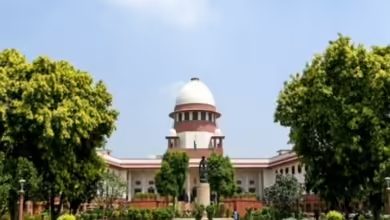On May 25, two crore voters will choose 223 candidates for Haryana’s ten seats
May 24, Chandigarh After weeks of intense campaigning for 10 parliamentary seats in the sixth round of the Lok Sabha elections, over two crore voters—94 lakh of them are women—will determine the destiny of 223 candidates in BJP-ruled Haryana on May 25. Among them are two Union ministers, Rao Inderjit Singh and Krishan Pal Gurjar.

Prominent figures in the race include two-time chief minister Manohar Lal Khattar of the BJP, Deepender Hooda of the Congress, and former Union minister Kumari Selja.
Four-time MP Selja is attempting her luck in Sirsa (reserved), the seat she twice held in the Lok Sabha, while Khattar, an RSS member with a clean reputation, is guaranteeing victory in his first Lok Sabha contest in Karnal. Three-time MP Hooda is on the ballot in the family Jat-dominated stronghold of Rohtak.
The youngest son of Savitri Jindal, the wealthiest lady in India, is 54-year-old Naveen Jindal of the BJP. He entered the race from Kurukshetra, the seat he served from 2004 to 2014, having switched from the Congress to the BJP in March.
Jindal will face Sushil Gupta, a former Rajya Sabha MP and AAP candidate. Kurukshetra has been allocated to the AAP, which is running in an alliance with Congress in the Haryana Lok Sabha elections.
Ashok Tanwar, a former Congress MP from Sirsa, has also been nominated by the BJP. Tanwar held the seat from 2009 until 2014. He was a member of the Aam Aadmi Party until joining the BJP in January.
The other contenders on the list include the BJP nominee from Rohtak and four-time MP Arvind Sharma, a physician by trade.
The Indian National Lok Dal (INLD), a regional party formed by one of Haryana’s tallest Jat leaders and former Deputy Prime Minister Chaudhary Devi Lal, and its offshoot, the Jannayak Janta Party (JJP), are struggling. The state is also experiencing a fratricidal war within the Lal dynasty.
In the dynastic supremacy struggle from Hisar seat, Devi Lal’s youngest son Ranjit Singh and Singh’s two daughters-in-law of his elder brother and five-time chief minister O.P. Chautala are pitted against each other.
Ranjit Singh, a state government Cabinet member, is the BJP nominee; however, his two “bahus,” Naina Chautala and Sunaina Chautala, are running for the JJP and the INLD, respectively.
Sunaina is the wife of Ravi Chautala, the son of INLD patriarch O.P. Chautala’s older brother Pratap Chautala, while Naina is the mother of former Deputy Chief Minister Dushyant Chautala and the wife of Ajay Chautala, Devi Lal’s grandson.
In addition to the Lok Sabha elections, there will be a by-election for the Karnal assembly seat, which Khattar left vacant. Chief Minister Nayab Singh Saini, the outgoing MP from Kurukshetra in the Lok Sabha, is one of nine candidates running for this seat. In March, Saini took over as chief minister from Khattar.
In the midst of an oppressive heat wave, voting in the sixth round of the seven-phase elections for the Lok Sabha and the single assembly seat will take place simultaneously from 7 am to 6 pm. June 4 is the date of the vote count.
In addition to Jat resentment, a growing crime rate, and unemployment, the major opposition Congress is relying on “anti-incumbency” to challenge the BJP’s ten years of power in the state, while the BJP is counting on “Modi Magic” to win back every parliamentary seat.
There is a close race between the Congress and the BJP, according to ground sources.
Regional parties, the JJP and the INLD, are running for seven and ten seats, respectively, and are mostly depending on traditional Jat support, which makes up 28% of the state’s population. For nine seats, the BSP has put forth candidates.
This time, the Congress, headed by well-known Jat politician and two-term Chief Minister Bhupinder Hooda, will mount a formidable challenge against both the INLD and the JJP in an attempt to preserve their “sinking ships.” Even though the BJP received 50% of the votes cast by Jats in the 2019 Lok Sabha elections, it still relies on non-Jat upper caste politics.
Of the state’s voters, 21% are members of the Other Backward Classes (OBC) group, which includes Chief Minister Saini.
Krishan Pal Gurjar and Rao Inderjeet Singh, two incumbent OBC MPs from Faridabad and Gurugram, respectively, have been renominated.
IANS was informed by Chief Electoral Officer Anurag Agarwal that 19,812 voting places had been established across the state.
Furthermore, 219 makeshift polling locations have been established. All voting places have made additional preparations in light of the heatwave.
According to Director General of Police Shatrujeet Kapur, 112 paramilitary companies, over 24,000 home guards, and over 35,000 police officers will be on duty throughout the elections.
In addition, 300 checkpoints at interstate and intrastate borders will be set up.
There will be 10,343 voting places in the state. Of them, 1,362 locations—containing 3,033 booths—have been classified as critical, while 51 booths have been classified as vulnerable, requiring the deployment of extra police.
In addition to 34 fast reaction teams, there will be 418 flying squads and 415 static surveillance teams. He said that 1,039 patrolling parties would work around the clock to enforce adherence to the model code of conduct and law and order.
The BJP improved its results from 2014, when it won seven of the eight seats it had contested, by winning all ten of the seats in 2019 with a 58% vote share.
However, in the October 2019 assembly elections, the BJP’s vote share dropped to 22%.







